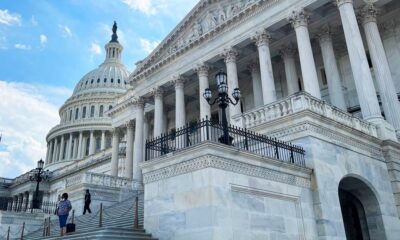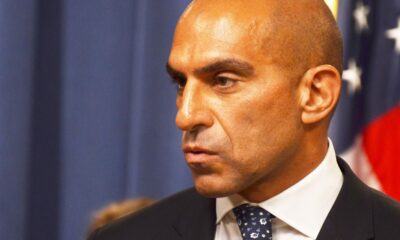Regulation
Ron Wyden on FISA Reform and Crypto

Sen. Ron Wyden (D-Ore.) has been a long-standing member of the U.S. Senate, and was a sponsor or co-sponsor of several key pieces of legislation enabling broad adoption of the internet. More recently, he voted in favor of a House Resolution overturning the Securities and Exchange Commission’s Staff Accounting Bulletin 121, and questioned threats to personal and financial privacy online.
You’re reading State of Crypto, a CoinDesk newsletter looking at the intersection of cryptocurrency and government. Click here to sign up for future editions.
Last month, Sen. Ron Wyden spoke at CoinDesk’s Consensus 2024 conference. As with previous versions of this newsletter, my questions have been shortened but the Senator’s responses. have only been edited lightly.
The Senator has been a key voice in both support of the internet and personal privacy online – two key issues for the crypto industry.
So before we really get into the meat of things, I just want to start with you. How are you here? What are you looking at?
Well, it’s great to get out and learn, and this really goes back to my roots in technology. I showed up in the Senate, when only [former Senator] Pat Leahy (D-Vt.) knew how to use a computer. And I got a chance to write some of the foundational rules of the internet since [Senator Spencer] Abraham (R-Mich.) and I wrote the digital signatures law. I wrote the internet tax non-discrimination law, the law that relates to platforms so that the individual is accountable. And that really kind of sparked my interest in technology policy, which is still the biggest challenge for the Senate – is getting its arms around new technology.
What’s your interpretation of the atmosphere around [crypto] within the Senate? How are lawmakers looking at this?
We’ve made a lot of headway, but there’s a long way to go. And apropos of how I got started on this, as part of the bipartisan infrastructure bill, at the last minute, a group of senators said, “We’re gonna fund this by taxing the software developers and the coders,” and I said, “hey, I don’t know everything about crypto, but these are folks using their First Amendment rights. They’re the creators.”
And by the way, at the top of my priority list is getting more of these creators in the United States of America, because we are losing in many instances to foreign countries. And so when they said, ‘”we’re gonna tax coders to the tune of $50 billion,” I said, “I’d like to know a little bit more about it,” because why are we saying that people who are creative software developers are basically going to do taxing for everybody. And we basically were able to waylay that. And it is kind of symptomatic of what our challenge is. New things come up, and people said, “well, nobody in the Senate knows about it.” And when friends said, they forgot about Ron, and I said, “hold on. I don’t know everything about it. But I know that taxing the software developers without any hearings, without any discussion for $50 billion is a mistake.” And I’m still supporting software developers as a key part of blockchain in our challenge.
A few weeks ago, the Senate passed the Congressional Review Act bill to repeal or overturn the SEC Staff Accounting Bulletin 121. That’s super controversial within the crypto circles, and you were one of the 11 Democrats who helped bring that through the Senate. And could you just speak to how you view this.
Yeah, just to make sure everybody knows what we’re talking about. This is essentially about accounting. So you talk about root canal work, this is like the staff accounting bulletin is what It’s called, it’s not really enforceable. But it basically sets up a different standard for crypto than everybody else has in the financial sector with respect to custody. So this is a pretty complicated thing. And I remember being down on the Senate floor and a lot of senators are going, “huh, what is this? Why didn’t we have any hearings? Why didn’t we have any discussion?” And a lot of us said that before, you’re going to say that crypto doesn’t have the same kinds of custodial arrangements as other financial fields, we ought to have some real discussion about it. And a group of us said, “let’s just hold on here and take the time to make sense and not just establish a whole separate unique barrier to storing customers crypto.”
Do you have any thoughts on – without speaking to a specific bill – is there a need for a market structure bill, legislation addressing this market?
There certainly is and what you really need is a regulatory framework. And that’s what Chairman [Patrick] McHenry is trying to do. And you need to be tough on the scamsters and the rip-off artists, and one of the reasons I wanted to come is I wanted to find out new ways in which particularly blockchain and others are trying to do this.
And I know you all are stepping up your game in terms of fighting terrorism and fraudsters and the cartels and the like, and I think that’s really key. It’s getting late in this session, so it’s unclear how far that bill will move, but I think Chairman McHenry is right to establish a kind of regulatory framework and put a sharper focus on fighting fraud and rip-off artists.
You recently signed a letter alongside Senator Cynthia Lummis of Wyoming kind of questioning the DOJ almost about how they’re interpreting law, and the context of that was, of course, the DOJ is pursuing charges against a developer of Tornado Cash, Roman Storm. Can you speak a little bit to the letter and its contents?
I never talk about specific cases and companies and the facts. But Senator Lummis and I have partnered on a number of bipartisan efforts. And we wanted to make sure that you weren’t painting an entire economic sector with one brush, because you felt that one firm and again, I’m not getting into the facts, was engaged in conduct you’re concerned about. And so, again, we come back to the software developers. People always say, I’m getting repetitive about it, but if you walk out of here with two thoughts: I’m interested in software developers, I’m interested in stable coins. And I think that there’s an opportunity for a lot of creativity. I very much want to see a portable medical record. You’ve had all these politicians and legislators talking about this for literally decades. I think blockchain is capable of doing it. And that’s the kind of story we want to tell.
One of the things you’re perhaps best known for, certainly, alongside the last few months has been your work on reforming FISA, basically a surveillance act. And I’d love to just hear your thoughts on what happened and then where we go from here.
I don’t mind it when people say I’m one of the leading private hawks, privacy hawks in public life. Because, you know, I think people are entitled, law-abiding people are entitled to a zone of privacy. You know, surveillance is one of the most ominous aspects of American life. And what I want to do is make sure in areas like a public policy, like the Foreign Intelligence Surveillance Act, we recognize the trends and the trends are that global communications are more globally integrated, and we ought to protect the privacy rights of Americans swept up in those searches and that’s been a big push of mine with respect to Section 702 of the Foreign Intelligence Surveillance Act.
Do you have any specific – obviously the bill went through, I believe it was just reauthorized without any changes, although–
We already are on our way to some improvements, there are going to be some guardrails in the intelligence authorization bill. But here’s another concern. What we say in the intelligence field is sources and methods. As those patriotic individuals gathered the information about those who might be threats to the country, sources and methods always need to be secret. But the law always needs to be public.
It ought to be possible for Americans to sit at their Starbucks, have a coffee or soda or something, and read a public law, it’s called public for a reason. It gives us a chance to hold elected officials accountable. And unfortunately, the reforms that are being discussed with respect to FISA, a big chunk of that is going to be secret, I call it secret law. And that’s another thought you gotta walk out of here from this discussio, is the sources and methods and intelligence how they gather the information needs to be secret laws need to be public.
What other improvements would you make if you had your way with this bill?
What I have said is that when you’re going to get the information of a law-abiding American, you should have a warrant. And my FISA approach would have established that with an exception, if the government thinks that there’s an imminent threat.
So I see lots of good folks out in the audience. What this means is that the government has to have a warrant, if it is going to get information picked up in these FISA searches about law-abiding Americans. But if there is an imminent threat to folks, for example, here or somewhere else, then the government can go get the information and settle up later.
There’s this question of balancing privacy and the right to do things online, transact, send money around–
Before we pit one of them against the other, let’s make sure that some of us in public life feel that security and liberty aren’t mutually exclusive. We can have both..
So speaking of things that are surveilling us, AI has been pretty in the news recently for everything that’s been going on. I’m just curious if you have any thoughts on, should there be kind of a regulatory framework guiding the development, the data gathering, the building of these new tools? And what might that look like?
I’ve introduced the Algorithm Accountability Act, with Senator [Cory] Booker (D-N.J.), Congresswoman [Yvette] Clarke (D-N.Y.), and my Algorithmic Accountability Act very much resembles some of the things I started on decades ago. There is transparency, there’s accountability, there’s equity, and it’s a smart touch.
I’m not prepared for the government to just create massive layers of government and expense right now, what I want us to do is target in on real problems. I mean, minorities, for example, have huge problems with housing and credit and access to education. That’s what Senator Booker and Congresswoman Clarke and I are going after, we’re going to find out how the algorithms are presented, who’s holding the accountability side of the ledger, and I think that’s a smart way to start.
And by the way, those are my roots, roots with the innovators, the First Amendment folks, and I’m applying it to a lot of fields, I think, I don’t know if you’re gonna get into it, but I’m a strong supporter of stablecoins. I love the name stablecoins, because right away that sends a message that if you peg it to the dollar or something like that you’re serious about, you know, protecting an array of interests.
What’s needed to either you know, either help stablecoins develop in a safe way or is there too much already going on around regulation?
I think we’re just getting started. I mean, look, I heard a rumor that there was an election coming up, and I’m not here to electioneer for one person or another person, we can do that later. But I think I’ve always felt the best politics is good policy. And what we’re talking about with a decentralized approach to finance and competition and strong consumer protection, so you could catch the fraudsters, that’s a great issue for people to run on. And I’m certainly telling my colleagues, that’s, I think, an approach where you do good and do well.
What are just kind of specifics of good policy that, in your view, are lacking right now, around stablecoin development?
Well, the biggest challenge for the Congress is to get its arms around new technology. And the Congress has some people who are sort of traditionalists, and they’re a little bit concerned about competition and choice, they think it’ll lead to disruption. And then there’s a group that don’t know too much about it. And what I think we need to do is find that kind of third path, I always tell my colleagues, if you can find a really good staff person who combines a willingness to learn and an interest in, in the subject, that’s really the coin of the realm in the Senate.
I want to move to the elections a little bit, I have heard that there’s something in November, possibly–
We’re seeing a, I would say almost a “surge of momentum” has been how it’s been described by a lot of the companies and individuals following this, between the votes over the last few weeks, and just some of the other activities. We’re seeing lawmakers and candidates for office really appealing to crypto specifically. Is this a surge of momentum? Will this interest from candidates and lawmakers last beyond November?
We have the potential to really build on the progress we made. Two years ago, I think it’d be fair to say, this was a field that people were not particularly supportive of. And I think now we’re getting to the point where sometime soon, you can have your Thanksgiving dinner, and your grandparents or your parents might be around and they’d say, “tell me about this crypto thing, I’m thinking about putting a little bit of money in it.”
Now, I’m not a financial adviser or anything like that. But I think we now have some opportunities in the kinds of areas that we’re talking about. I mean, think about the software developers, these are the people that folks in politics say they want the most. They’re young, they’re creators, they’re innovative, they’re coming up with, with solutions, in terms of processing, you know, financial assistance to people, bills of lading on paper so outdated, we can use something different for competition and in choice in supply chain. These are great opportunities.
From the voter perspective, are you seeing a lot of voter interest in this issue or constituents reaching out and saying, “this is something I care about?”
I’m getting more questions, I’ve had 1,085 town hall meetings, throw open the doors to my constituents and let them ask questions. Look, this is not getting the same interest as inflation because people feel that they’re getting really hit in the supermarket or health care costs or something else. But there’s no question that there is growing interest here. It’s being driven by a lot of young, creative people.
The blockchain is especially interesting to people in terms of the federal government’s role in money management. I think we’ve got an opportunity to really build interest here. And part of what I’ve told people is, what we need to do is talk about areas like the software developers, we need to make it clear we don’t take a backseat to anybody in terms of fighting fraud. And based on what I’ve been hearing as I go around groups, there are a lot of people in blockchain and crypto who are already involved in working with the government on terrorism fights.
So for our audience viewing physically here and online watching, what would you say is a useful and productive way for them to engage with your office and with your colleagues?
Political change hardly ever starts in Washington, DC and then trickles down, it’s almost always the opposite. It starts at the grass roots and builds upward. What you can do in terms of trying to create more opportunities, particularly for blockchain, is be in contact with your legislators, talk about areas that you think they’ll be interested in, like jobs, jobs are still a big issue in every single meeting I go into. To be able to say these young software developers can do that work in the United States, make a good wage, rather than what we’ve seen where so many of them have gone overseas.
So the power is really in the hands of people here and the people, we’re following this online, I think we’re live streaming. And I’ll just tell you, I look back at my involvement in technology. And I’m so glad that I had that opportunity. And I still believe it’s based on knowing what you don’t know. And that’s really the heart of trying to create good policy, it’s listening. That’s what I did at my town hall meetings over the last week or so, and then going back to DC and talking to a cross section of people, and particularly issues like stable coins, software developers fighting fraud, trying to partner with the government wherever possible in terms of public services, that puts you on the right side of history.
As we begin to wrap up today, I’m just really curious, you know, I want to give you an opportunity, just, you know, what are you watching now? Are there any specific topics and issues, whether it’s in Congress, whether it’s in you know, in Oregon?
At home, the issue that I know, will present as the second word is bill, it might be medical bill, it might be housing bill, it might be gas bill. It’s all about, you know, the challenge, post-COVID, of coming out and finding a way, with lots of industries no longer being here, a path ahead. And that’s why I come back to people like the software developers, those were kind of my roots. That was my first experience with crypto when a bunch of Senators went to the floor and said, “we’re going to sock these developers for $50 billion worth of taxes.” And I said, “wait a minute, how did the software developers suddenly acquire expertise in tax collection,” and we waylaid. So the big challenge of our time is to listen. And I can tell you right now, the supreme supreme opportunity is to focus on these economic issues, and make better use of scarce resources.
I just really want to thank you again, for coming up here. And thank you all for sticking around for the last day [of Consensus].
You know, in DC when you wrap up, somebody always makes a big speech. And sometimes they’re god awful. I’m just going to say thank you. Thank you. Because this is an opportunity to learn and to listen. That’s what I think public policy is supposed to be all about. So we’ll put today’s discussion in the “to be continued” department. Thanks, everybody.
If you’ve got thoughts or questions on what I should discuss next week or any other feedback you’d like to share, feel free to email me at nik@coindesk.com or find me on Twitter @nikhileshde.
You can also join the group conversation on Telegram.
Regulation
South Korea Moves to Delay Cryptocurrency Tax Until 2028 Amid Market Concerns

South Korean lawmakers have proposed a bill to delay the tax on cryptocurrency earnings until 2028.
The ruling political party proposed the bill on July 12, citing current negative sentiment around the cryptocurrency sector as the reason for the extension. declared:
“With investor sentiment toward virtual assets deteriorating, some argue that hasty taxation of virtual assets is not desirable at this time, as virtual assets are high-risk assets with a higher risk of loss than stocks, and if income tax were also imposed, it is expected that most investors would abandon the market.”
South Korea had originally planned to implement its cryptocurrency earnings tax on January 1, 2025. However, if the new bill is passed, the implementation date will be moved to January 1, 2028. The subcommittee met on July 15 to continue the review.
The move is in line with President Yoon Suk-yeol’s campaign promisesHe assured voters that he would extend the cryptocurrency earnings tax during the last general election if elected. His administration aims to create a clear regulatory framework before implementing the tax.
However, the Ministry of Economy and Finance has not yet decided on the postponement. The ministry plans to announce new amendments to the fiscal policy by the end of the month.
“No decision has been made on further postponing the implementation of taxation of income from virtual activities,” a ministry spokesperson said. She said.
South Korea’s Thriving Cryptocurrency Industry
South Korea is one of the fastest-growing countries in the world in adopting this emerging sector.
In the first quarter of this year, blockchain platform Kaiko reported that the Asian country’s national currency, the Won, emerged as the leading currency for global cryptocurrency trading, with a cumulative trading volume of $456 billion across centralized exchanges.
Furthermore, the Asian country is a shining light for its proactivity approach to cryptocurrency regulationSouth Korea has implemented different rules designed to improve consumer protection standards for cryptocurrency users in its jurisdiction.
Latest stories from South Korea
Regulation
ESAs consult on guidelines for cryptocurrency regulation

THE European Supervisory Authoritiesincluding EBA, EIPA and ESMA, have published a consultation paper on guidelines under the Markets in Cryptocurrencies Regulation (MiCAR).
In doing so, the ESAs intended to develop templates for legal explanations and opinions regarding the classification of cryptocurrencies along with a standardized assessment to support a common approach to classification. In addition, the current move is intended to assist market participants and supervisors in accommodating a standardized test while receiving legal explanations and opinions that provide descriptions of the regulatory classification of cryptocurrencies in different cases. Among them, the ESAs mention:
-
Asset-Referenced Tokens (ART), whose white paper for their issuance must be accompanied by a legal opinion that highlights the classification of the crypto-asset, especially with regard to the fact that it is not an electronic money token (EMT) or a crypto-asset that could be excluded from the scope of MiCAR;
-
Cryptocurrencies that are not considered ART or EMT under the Regulation, for which the white paper must be accompanied by an explanation of the classification of the cryptocurrency, in particular information that is not an EMT, ART or a cryptocurrency are excluded from the scope of MiCAR.
As part of the press release, the ESAs mention that the consultation paper can be submitted directly from the consultation page, with a deadline for submissions of 12 October 2024. After holding a virtual public hearing on the consultation paper on 23 September 2023, the authorities are ready to publish all contributions, unless otherwise requested.
Background
In an effort to establish a framework for the provision of crypto-asset services, MiCAR develops regimes to regulate the issuance, supply to the public and admission to trading of EMT, ART and other crypto-assets. The draft was created under Article 97(1) of MiCAR, which requires authorities to jointly provide by 30 December 2024 the Guidelines pursuant to Article 16 of the ESA Regulations (EU Regulation) No. 1093/2010 Regulation 1094/2010, Regulation 1095/2010) to specify the content and form of the explanation accompanying the white paper on crypto-assets referred to in Article 8(4) and the legal opinions on the qualification of asset-referenced tokens (ARTs) referred to in Article 17(1), point (b)(ii) and Article 18(2), point (e) of MiCAR.
In addition, ESAs are required to include in the Guidelines a model for explanation and opinion and a standardized test for the classification of cryptocurrencies. At the time of the announcement, this was the only joint policy mandate of ESAs developed under MiCAR.
Regulation
Cryptocurrency News Today – July 15, 2024

Welcome to “Crypto News Today”, your daily digest of the cryptocurrency industry.
Bitcoin ETFs surge amid price recovery, market fluctuations
Bitcoin ETFs have seen their best weekly inflows since May, with $882 million in the week ending July 11. Bitcoin’s price has recovered to around $62,000, up 15% from its recent low, reflecting renewed investor interest and market optimism. To learn more, visit the TDR website!
Bitcoin Surpasses Leveraged ETFs
Bitcoin’s price has outperformed risky leveraged ETFs like BITX and BITU, demonstrating the cryptocurrency’s relative stability in a volatile market. Investors are increasingly favoring direct Bitcoin holdings over complex financial products.
SEC Closes Investigation into Hiro Systems
The SEC has concluded its three-year investigation into Stacks developer Hiro Systems without taking any enforcement action. The move brings relief to the company and its shareholders, potentially increasing confidence in the Stacks ecosystem.
Genesis Transfers 760 Million BTC to Coinbase
Amid a market sell-off, Genesis advanced $760 million in Bitcoin to Coinbase. The large transfer has raised speculation about potential trading strategies or liquidity by the digital asset company.
JP Morgan-Backed Partior Closes $60M Series B
JP Morgan-backed blockchain firm Partior has successfully closed a $60 million Series B funding round. The funds will support Partior’s mission to simplify cross-border payments and advance blockchain-based financial solutions.
Cryptocurrencies Become The Theme of 2024
Cryptocurrencies have emerged as a key issue in the 2024 political landscape, with parties and candidates debating regulation, innovation, and the future of digital currencies. This trend underscores the growing importance of cryptocurrencies in economic and political discussions.
Read more cryptocurrency news on the TDR website!
Regulation
How Cryptocurrency Firms Are Capitalizing on MiCA’s Bumpy Launch – DL News

- The MiCA licensing regime will come into force at the end of December.
- Levels of severity vary from country to country.
- This will create opportunities for companies to engage.
Stablecoin laws have already come into force, but EU countries are rushing to comply with the rest of the Union’s new cryptocurrency regulation before the deadline.
The EU regulatory framework requires cryptocurrency businesses such as exchanges to choose a country in which to apply for a license. In practice, countries will inevitably have different levels of stringency.
The Markets in Crypto-Assets regulation is designed to introduce a level playing field across the EU, as national regulators will have to adhere to the same set of standards. Once licensed, crypto-asset service providers, or CASPs, can move their services anywhere in the bloc.
Additionally, countries are allowed to opt for longer transition periods before enforcing the MiCA rules. This is known as the grandfathering period.
All of this could call into question the level of compliance in some countries.
— Ernest Lima, XReg Consulting
That creates opportunities for cryptocurrency firms to seek out jurisdictions with lighter rules and less enforcement, said Ernest Lim, a partner at consultancy XReg. DL News.
“Cryptocurrency companies registered or licensed in different EU member states may be subject to different requirements” between January 2025 and July 2026, Lima said.
Due to time and capacity constraints, some local regulators may have difficulty processing applications in time for the deadline, he added.
“Some may not even have sufficient resources to adequately supervise licensed CASPs,” Lima said.
Join the community to receive our latest stories and updates
“All of this could call into question the level of compliance in some countries.”
Companies are already exploiting the patchy way MiCA regulations are enforced in the EU, in a practice known as regulatory arbitrage, Lima said.
Just the beginning
MiCA’s stablecoin laws went into effect on July 1st, marking the start of the launch.
The next stage is the MiCA licensing regime for cryptocurrency businesses, including exchanges, custodians and investment firms, which will come into force on December 30.
Although the new rules will be stricter, CASPs registered in one country will be able to offer their services throughout the EU27 under the MiCA ‘passporting’ provisions.
Some countries with simpler registration requirements already have significant numbers of VASPs on their registers.
Lima said he expects the number of CASPs in Europe to consolidate significantly, especially in those countries.
In countries with more flexible regulators, companies can benefit from a relatively simple registration process to enter Europe.
According to XReg data, for example, Lithuania has 588 VASPs, while Germany has 12.
Transition period
The MiCA safeguard period will also impact where companies apply for licenses, Lima said.
The grandfathering period is a transition starting on December 30, during which companies can switch to the more stringent CASP regime.
Countries can grant cryptocurrency firms up to 18 additional months from December 30, although the EU securities watchdog recommends a 12-month safeguard period.
In assessing how much time to give companies to transition to the CASP regime, countries will have considered “how prepared they are internally to process applications, the gap between MiCA and their current regime, and the number of companies currently registered in their jurisdictions, all of which influence the workload associated with the transition,” Lima said.
Some countries have announced their transition, others have not, he added.
Among those who have announced:
- France will allow a ramp-up period of 18 months. The country already has a regime similar to MiCA in place.
- Many countries, including Ireland, Germany, Spain and Austria, are opting for the recommended 12-month transition.
- Lithuania, which has very lax AML requirements and a large number of registered VASPs, has been at a standstill for five months.
- The Netherlands will implement the MiCA regime on 30 December and is already accepting applications.
Strategie
Lima said that cryptocurrency companies are evaluating different strategies to take advantage of this uneven distribution.
Some companies are aiming to comply as soon as possible, by December 30, which means they will be the first to avail themselves of passporting rights and gain market share in the EU.
“Others are opting to file multiple applications in EU jurisdictions,” he said.
This approach allows a firm to benefit from a transition period in a trusted jurisdiction while working on a MiCA application.
However, he said that time was running out: local regulators were preparing to start the MiCA application process.
“Soon there will be no more time to process new applications.”
Lima said some companies have no intention of ever complying with MiCA.
Instead, they chose to continue working as long as possible before closing their businesses for good.
Contact the author at joanna@dlnews.com.
-

 News1 year ago
News1 year ago“Captain Tsubasa – RIVALS” launches on Oasys Blockchain
-

 Ethereum1 year ago
Ethereum1 year agoComment deux frères auraient dérobé 25 millions de dollars lors d’un braquage d’Ethereum de 12 secondes • The Register
-

 News1 year ago
News1 year agoSolana ranks the fastest blockchain in the world, surpassing Ethereum, Polygon ⋆ ZyCrypto
-

 Videos1 year ago
Videos1 year agoHistoric steps for US cryptocurrencies! With a shocking majority vote!🚨
-

 Videos1 year ago
Videos1 year agoIs Emorya the next gem💎 of this Bitcoin bull run?
-

 News1 year ago
News1 year agoSolana Surpasses Ethereum and Polygon as the Fastest Blockchain ⋆ ZyCrypto
-

 Videos1 year ago
Videos1 year agoNexus Chain – Ethereum L2 with the GREATEST Potential?
-

 Ethereum1 year ago
Ethereum1 year agoScaling Ethereum with L2s damaged its Tokenomics. Is it possible to repair it?
-

 News1 year ago
News1 year agoFnality, HQLAᵡ aims to launch blockchain intraday repositories this year – Ledger Insights
-

 Regulation1 year ago
Regulation1 year agoFinancial Intelligence Unit imposes ₹18.82 crore fine on cryptocurrency exchange Binance for violating anti-money laundering norms
-

 Bitcoin1 year ago
Bitcoin1 year agoBitcoin Drops to $60K, Threatening to Derail Prices of Ether, Solana, XRP, Dogecoin, and Shiba Inu ⋆ ZyCrypto
-

 News1 year ago
News1 year agoSendBlocks Debuts with Major Support to Improve Blockchain Data Management




















